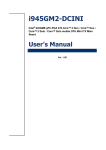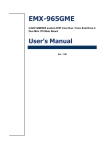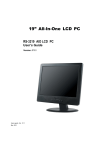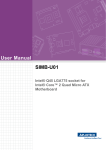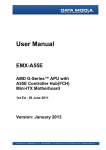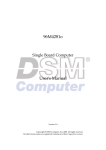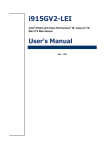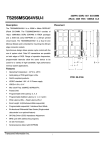Download Intel MX945GM2 User's Manual
Transcript
Intel® 945GME µFC-PGA 478 Core™ 2 Duo / Core™ Duo / Core™ 2 Solo / Core™ Solo mobile CPU Mini ITX Main Board Ver. 1.00 MX945GM2 ..........................................................................................................4 ............................................................................................................5 ....................................................................................5 ! " #$ .......................................................................................................................6 % & ...............................................................................................................7 ..................................................................................................8 ' "( # .................................................................................................................11 ! 1.1 ...............................................................................................13 Before you Proceed ................................................................................................13 1.2 Motherboard Overview............................................................................................14 1.2.1 Placement Direction ....................................................................................................................... 14 1.2.2 Screw Holes ................................................................................................................................... 14 1.3 1.3.1 1.4 Layout Content List ........................................................................................................................ 16 Central Processing Unit (CPU)................................................................................18 1.4.1 Installing the CPU........................................................................................................................... 19 1.4.2 Installing the CPU Heatsink and Fan ............................................................................................. 21 1.4.3 Uninstalling the CPU Heatsink and Fan......................................................................................... 23 1.5 System Memory ......................................................................................................24 1.5.1 DIMM Sockets Location ................................................................................................................. 24 1.5.2 Memory Configurations .................................................................................................................. 25 1.5.3 Installing a DDR2 DIMM................................................................................................................. 26 1.5.4 Removing a DDR2 DIMM............................................................................................................... 26 1.6 Expansion Slots ......................................................................................................27 1.6.1 Installing an Expansion Card ......................................................................................................... 27 1.6.2 Configuring an Expansion Card ..................................................................................................... 27 1.6.3 Standard Interrupt Assignments..................................................................................................... 28 1.6.4 PCI Slots......................................................................................................................................... 29 1.6.5 PCI Express X16 Slot..................................................................................................................... 29 1.6.6 Mini PCI .......................................................................................................................................... 29 1.7 2 Motherboard Layout ................................................................................................15 Jumpers ..................................................................................................................30 1.7.1 Clear CMOS (J4) ............................................................................................................................ 30 1.7.2 Watchdog Timer Output Select (J6)............................................................................................... 31 1.7.3 AT/ATX Power Select (J7) ............................................................................................................. 31 1.7.4 LVDS Extended Setting (J14) ........................................................................................................ 32 1.7.5 COM1, COM2 RI/+5V/+12v Selection (JP14, JP15)...................................................................... 32 User’s Manual 1.8 Connectors..............................................................................................................33 1.8.1 Rear Panel Connectors .................................................................................................................. 33 1.8.2 ATX Power Connector (ATX_PWR1)............................................................................................. 35 1.8.3 USB 2.0 Connector (CN4, CN5) .................................................................................................... 36 1.8.4 Serial Port 2 Connector (CN6) ....................................................................................................... 37 1.8.5 Serial Port 3 Connector (CN7) ....................................................................................................... 37 1.8.6 Serial Port 4 Connector (CN8) ....................................................................................................... 38 1.8.7 Front Panel Audio Connector (CN16) ............................................................................................ 38 1.8.8 Case Open Connector (CN19) ....................................................................................................... 39 1.8.9 CPU Fan Connector (C_FAN1)...................................................................................................... 39 1.8.10 System Panel Connector (F_PANEL1)...................................................................................... 40 1.8.11 Primary IDE Connector (IDE1)................................................................................................... 41 1.8.12 IrDA Connector (IR_CON1) ....................................................................................................... 41 1.8.13 Amplifier Connector (JAMP1) .................................................................................................... 42 1.8.14 Optical Drive Audio Connector (JCD1) ...................................................................................... 42 1.8.15 LCD Inverter Connector (JBKL1) ............................................................................................... 43 1.8.16 Digital I/O Connector (JGPIO1) ................................................................................................. 44 1.8.17 Digital I/O Connector (JGPIO2) ................................................................................................. 44 1.8.18 LVDS Connector (JLVDS1) ....................................................................................................... 45 1.8.19 Serial ATA Connector [Black] (SA1, SA2) ................................................................................. 45 1.8.20 SM Bus Connector (SM_BUS1)................................................................................................. 46 1.8.21 Digital Audio Connector (SPDIF_OUT1) ................................................................................... 46 1.8.22 Chassis Fan Connector (S_FAN1) ............................................................................................ 47 MX945GM2 3 MX945GM2 Electrical safety To prevent electrical shock hazard, disconnect the power cable from the electrical outlet before relocating the system. When adding or removing devices to or from the system, ensure that the power cables for the devices are unplugged before the signal cables are connected. If possible, disconnect all power cables from the existing system before you add a device. Before connecting or removing signal cables from the motherboard, ensure that all power cables are unplugged. Seek professional assistance before using an adapter or extension cord. These devices could interrupt the grounding circuit. Make sure that your power supply is set to the correct voltage in your area. If you are not sure about the voltage of the electrical outlet you are using, contact your local power company. If the power supply is broken, do not try to fix it by yourself. Contact a qualified service technician or your retailer. Operation safety Before installing the motherboard and adding devices on it, carefully read all the manuals that came with the package. Before using the product, make sure all cables are correctly connected and the power cables are not damaged. If you detect any damage, contact your dealer immediately. To avoid short circuits, keep paper clips, screws, and staples away from connectors, slots, sockets and circuitry. Avoid dust, humidity, and temperature extremes. Do not place the product in any area where it may become wet. Place the product on a stable surface. If you encounter technical problems with the product, contact a qualified service technician or your retailer. The symbol of the crossed out wheeled bin indicates that the product (electrical and electronic equipment) should not be placed in municipal waste. Check local regulations for disposal of electronic products. 4 User’s Manual If a problem arises with your system and no solution can be obtained from the user’s manual, please contact your place of purchase or local distributor. Alternatively, please try the following help resources for further guidance. Visit the Advansus website for FAQ, technical guide, BIOS updates, driver updates, and other information: http://www.advansus.com.tw/Support/Support.asp To make sure that you perform certain tasks properly, take note of the following symbols used throughout this manual. DANGER/WARNING: Information to prevent injury to yourself when trying to complete a task. CAUTION: Information to prevent damage to the components when trying to complete a task. IMPORTANT: Instructions that you MUST follow to complete a task. NOTE: Tips and additional information to help you complete a task. MX945GM2 5 MX945GM2 ! " #$ Before you begin installing your single board, please make sure that the following materials have been shipped: 1 x i945GME Mini ITX Main board 1 x CD-ROM contains the followings: User’s manual (this manual in PDF file) Drivers 2 x COM cable 1 x IDE HDD cable (40-pin, pitch 2.54mm) 2 x SATA cable kit (SATA/Power) 1 x Startup Manual If any of the above items is damaged or missing, please contact your retailer. 6 User’s Manual % & Revision V 1.0 Revision History First release for PCB 1.00 Date January 10, 2008 MX945GM2 7 MX945GM2 CPU Chipset Memory Features Graphic Panel Audio LAN Supports Intel µFC-PGA 478 Core 2 Duo / Core Duo / Core 2 Solo / Core Solo mobile CPU with 65nm process technology Intel 82945GME Express Chipset Two 240-pin DIMMs up to 4GB Dual Channel DDR2 533/667 SDRAM Intel Graphics Media Accelerator 950 Dual 18/24*-bit LVDS Realtek ALC888 Audio Code 5.1 CH. with Two independent audio stream Dual Marvell 88E8053 Gigabit LAN Controller Expansion 1 x PCI-E X16, 1 x PCI, 1 x Mini PCI, 1 x Type I/II CF I/O 4 x COM, 8 x USB 2.0, 2 x SATA, 1 x 8-bit Digital I/O System CPU Supports Intel µFC-PGA 478 Core 2 Duo / Core Duo / Core Solo CPU with 65nm process technology FSB 533/667 MHz BIOS Award 8 Mb Flash ROM BIOS System Chipset Intel 82945GME GMCH/82801GM ICH7-M DH I/O Chipset Winbond W83627EHG-A Memory Two 240-pin DIMM sockets support up to 4 GB Dual Channel DDR2 533/667 SDRAM SSD One CompactFlash Type I/II socket Watchdog Timer Reset: 1 sec.~255 min. and 1 sec. or 1 min./step H/W Status Monitor Monitoring CPU temperature, voltage, and cooling fan status. Auto throttling control when CPU overheats Expansion Slots One PCI Express X16, One PCI slot (PCI Rev. 2.2 compliant), One Mini PCI S3 S3 Support Smart Fan Control Yes I/O MIO 1 x EIDE (Ultra DMA 100), 4 x RS-232, 2 x SATA, 1 x K/B, 1 x Mouse (COM1, COM2 with power output) IrDA 115k bps, IrDA connector (1.0 compliant) USB 8 x USB 2.0 ports DIO 8-bit General Purpose I/O for DI and DO (Smbus) 8 User’s Manual Display Chipset Intel® 82945GME GMCH integrated Graphics Media Accelerator 950 Display Memory Intel® DVMT 3.0 supports 224 MB video memory Resolution 2048 x 1536 @ 32 bpp (85 Hz) Dual Display CRT + LVDS LVDS Intel® 945GME Dual 18-bit/24-bit LVDS 2nd LVDS Through ADD2 LVDS Card DVI / Onboard DVI Chips Secondary VGA Through ADD2 DVI Card Through ADD2 VGA Card Audio AC97 Codec Realtek ALC888 supports 5.1-CH with two independent audio stream Audio Interface Mic. in, Line in, CD Audio in, Line out Ethernet LAN1 Marvell 88E8053 PCI-E Gigabit Ethernet Controller LAN2 Marvell 88E8053 PCI-E Gigabit Ethernet Controller Back I/O Port 1 x PS/2 Keyboard 1 x PS/2 Mouse 1 x RS-232 Serial Port Back Panel 1 x VGA port 2 x LAN RJ45 port 4 x USB 2.0/1.1 5.1 CH Audio I/O (3 jacks) MX945GM2 9 MX945GM2 Internal I/O Connector 2 x USB connectors support additional 4 USB ports 1 x 20-pin ATX Power connector 1 x 40-pin IDE connector for two devices 3 x COM connector 2 x SATA connectors Internal I/O 1 x System panel connector 1 x CD-In connector 1 x SPDIF out connector 1 x SMbus management connector 1 x LVDS connector 1 x CPU Fan connector 2 x 6pin connector support 8Bit GPIO via SMbus PCA9554 Controller (Optional) Mechanical & Environmental Power Type ATX Operating Temperature 0~60°C (32~140°F) Operating Humidity 0%~90% relative humidity, non-condensing Size (L x W) 6.69" x 6.69" (170 mm x 170 mm) Weight 0.88 lbs (0.4 Kg) * Specifications are subject to change without notice. 10 User’s Manual ' "( # MX945GM2 11 MX945GM2 This chapter describes the main board features and the new technologies it supports. 12 User’s Manual ! 1.1 Before you Proceed Take note of the following precautions before you install motherboard components or change any motherboard settings. Unplug the power cord from the wall socket before touching any component. Use a grounded wrist strap or touch a safely grounded object or a metal object, such as the power supply case, before handling components to avoid damaging them due to static electricity Hold components by the edges to avoid touching the ICs on them. Whenever you uninstall any component, place it on a grounded antistatic pad or in the bag that came with the component. Before you install or remove any component, ensure that the ATX power supply is switched off or the power cord is detached from the power supply. Failure to do so may cause severe damage to the motherboard, peripherals, and/or components. MX945GM2 13 MX945GM2 1.2 Motherboard Overview Before you install the motherboard, study the configuration of your chassis to ensure that the motherboard fits into it. Refer to the chassis documentation before installing the motherboard. Make sure to unplug the power cord before installing or removing the motherboard. Failure to do so can cause you physical injury and damage motherboard components. 1.2.1 Placement Direction When installing the motherboard, make sure that you place it into the chassis in the correct orientation. The edge with external ports goes to the rear part of the chassis as indicated in the image below. 1.2.2 Screw Holes Place four (4) screws into the holes indicated by circles to secure the motherboard to the chassis. Do not over tighten the screws! Doing so can damage the motherboard. Place this side towards the rear of the chassis 14 User’s Manual 1.3 Motherboard Layout MX945GM2 15 MX945GM2 1.3.1 Layout Content List Slots Label Function Note (Rear side) Page CF1 Compact Flash Connector N/A DIMM1 240-pin DDR2 DIMM slot N/A DIMM2 240-pin DDR2 DIMM slot N/A MINI_PCI1 Mini PCI Slot N/A PCIEX16 PCI Express X16 Slot N/A PCI1 PCI Slot N/A Jumpers Label Function Note Page J4 Clear CMOS 3 x 1 header, pitch 2.00mm 30 J6 Watchdog Timer Output Select 3 x 1 header, pitch 2.00mm 31 J7 AT/ATX Power Select 3 x 1 header, pitch 2.00mm 31 J14 LVDS Extended Setting 3 x 2 header, pitch 2.00mm 32 JP14, JP15 COM1, COM2 RI/+5V/+12V 3 x 2 header, pitch 2.00mm 32 Selection Rear Panel Connector Label Function Note Page CN10 PS/2 keyboard and mouse 6-pin Mini-Din 33,34 CN1 Serial port connector VGA connector D-sub 9-pin, male D-sub 15-pin, female 33,34 CN3 RJ-45 Ethernet connector x 1 33,34 USB connector x 2 CN2 RJ-45 Ethernet connector x 1 USB connector x 2 AUDIO1 Line-in port, Line-out port, Microphone port, 16 33,34 5.1 Channel Audio I/O (3 jacks) 34 User’s Manual Internal Connector Label Function Note Page ATX_PWR1 ATX Power Connector 10 x 2 header 35 CN4 USB 2.0 Connector 5 x 2 header, pitch 2.00mm 36 CN5 USB 2.0 Connector 5 x 2 header, pitch 2.00mm 36 CN6 Serial Port 2 Connector 5 x 2 header, pitch 2.00mm 37 CN7 Serial Port 3 Connector 5 x 2 header, pitch 2.00mm 37 CN8 Serial Port 4 Connector 5 x 2 header, pitch 2.00mm 38 CN16 Front Panel Audio Connector 5 x 2 header, pitch 2.00mm 38 CN19 Case Open and Speaker Out Connector 4 x 1 header, pitch 2.00mm 39 C_FAN1 CPU Fan Connector 3 x 1 wafer, pitch 2.54mm 39 F_PANEL1 System Panel Connector 5 x 2 header, pitch 2.54mm 40 IDE1 Primary IDE Connector 20 x 2 header, pitch 2.54mm 41 IR_CON1 IrDA Connector 5 x 1 header, pitch 2.00mm 41 JAMP1 Amplifier connector 4 x 1 header, pitch 2.54mm 42 JBKL1 LCD Inverter Connector 5 x 1 header, pitch 2.00mm 43 JCD1 Optical Drive Audio Connector 4 x 1 header, pitch 2.00mm 42 JGPIO1 Digital I/O Connector 3 x 2 header, pitch 2.00mm 44 JGPIO2 Digital I/O Connector 3 x 2 header, pitch 2.00mm 44 JLVDS1 LVDS connector HIROSE DF13S-40DP-1.25V 45 SA1, SA2 Serial ATA connectors [Black] 7-pin header 45 SM_BUS1 SM Bus Connector 4 x 1 header, pitch 2.00mm 46 SPDIF_OUT1 Digital Audio connector 4 x 1 header, pitch 2.54mm 46 S_FAN1 Chassis Fan Connector 3 x 1 wafer, pitch 2.54mm 47 MX945GM2 17 MX945GM2 1.4 Central Processing Unit (CPU) The motherboard comes with a surface mount 478-pin socket designed for the Intel® Core 2 Duo / Core Duo / Core 2 Solo / Core Solo CPU with 65nm process. Take one of the marked corner (with gold triangle) on the CPU. This mark should match a specific corner on the socket to ensure correct installation. Make sure the AC power is off before you install the CPU. If installing a dual-core CPU, connect the CPU fan cable to the C_FAN1 connector to ensure system stability. Your boxed Intel® socket 478P Core Duo / Core Solo / Core 2 Duo CPU with 65nm process package should come with installation instructions for the CPU, heatsink, and the retention mechanism. If the instructions in this section do not match the CPU documentation, follow the latter. Upon purchase of the motherboard, make sure that the PnP cap is on the socket and the socket contacts are not bent. Contact your retailer immediately if the PnP cap is missing, or if you see any damage to the PnP cap/socket contacts/motherboard components. Your place of purchase or local distributor will shoulder the cost of repair only if the damage is shipment/transit-related. Keep the cap after installing the motherboard. Your place of purchase or local distributor will process Return Merchandise Authorization (RMA) requests only if the motherboard comes with the cap on the socket. The product warranty does not cover damage to the socket contacts resulting from incorrect CPU installation/removal, or misplacement/loss/ incorrect removal of the PnP cap. 18 User’s Manual 1.4.1 Installing the CPU 1. Locate the CPU socket on the motherboard. Before installing the CPU, make sure that the socket box is facing towards you. 2. The processor socket comes with a screw to secure the processor, please unlock the screw first. MX945GM2 19 MX945GM2 3. Position the CPU above the socket and the gold triangular mark on the CPU must align with pin 1 of the CPU socket. 4. 5. Carefully insert the CPU into the socket until it fits in place ‘Gold mark’. Turn the screw to the lock position. The CPU fits in only one correct orientation. DO NOT force the CPU into the socket to prevent bending the connectors on the socket and damaging the CPU. After installation, make sure to plug-in the ATX power cable to the motherboard. 20 User’s Manual 1.4.2 Installing the CPU Heatsink and Fan The Intel® socket 478P Core Duo / Core Solo / Core 2 Duo CPU processor requires a specially designed heatsink and fan assembly to ensure optimum thermal condition and performance. Install the motherboard to the chassis before you install the CPU fan and heatsink assembly. When you buy a boxed Intel® processor, the package includes the CPU fan and heatsink assembly. If you buy a CPU separately, make sure that you use only Intel® certified multi directional heatsink and fan. If you purchased a separate CPU heatsink and fan assembly, make sure that you have properly applied Thermal Interface Material to the CPU heatsink or CPU before you install the heatsink and fan assembly. 1. Place the heatsink on top of the installed CPU, making sure that the four fasteners match the holes on the motherboard. Orient the heatsink and fan assembly such that the CPU fan cable is closest to the CPU fan connector. Make sure each fastener is oriented as shown, with the narrow groove directed outward. MX945GM2 21 MX945GM2 2. Push down two fasteners at a time in a diagonal sequence to secure the heatsink and fan assembly in place. 3. Connect the CPU fan cable to the connector on the motherboard labelled C_FAN1. Do not forget to connect the fan cables to the fan connectors. Insufficient air flow inside the system may damage the motherboard components, and hardware monitoring errors can occur if you fail to plug this connector. These are not jumpers! DO NOT place jumper caps on the fan connectors. 22 User’s Manual 1.4.3 Uninstalling the CPU Heatsink and Fan 1. Disconnect the CPU fan cable from the connector on the motherboard. 2. Rotate each fastener counterclockwise. 3. Pull up two fasteners at a time in a diagonal sequence to disengage the heatsink and fan assembly from the motherboard 4. Carefully remove the heatsink and fan assembly from the motherboard. Refer to the documentation in the boxed or stand-alone CPU fan package for detailed information on CPU fan installation. MX945GM2 23 MX945GM2 1.5 System Memory 1.5.1 DIMM Sockets Location The motherboard comes with four 240-pin Double Data Rate 2 (DDR2) Dual Inline Memory Modules (DIMM) sockets. A DDR2 module has the same physical dimensions as a DDR DIMM but has a 240-pin footprint compared to the 184-pin DDR DIMM. DDR2 DIMMs are notched differently to prevent installation on a DDR DIMM socket. The following figure illustrates the location of the sockets: 24 User’s Manual 1.5.2 Memory Configurations You can install 128 MB, 256 MB, 512 MB, 1GB and 2GB DDR2 SDRAM DIMMs into the SODIMM sockets using the memory configurations in this section. Installing DDR2 DIMM other than the recommended configurations may cause memory sizing error or system boot failure. Use any of the recommended configurations. For dual-channel configuration, the total size of memory module(s) installed per channel must be the same (DIMM1 = DIMM2). Always install DIMMs with the same CAS latency. For optimum compatibility, it is recommended that you obtain memory modules from the same vendor. Due to chipset resource allocation, the system may detect less than 1 GB system memory when you installed one 1 GB DDR2 memory modules. This motherboard does not support memory modules made up of 128 Mb chips or double-sided x16 memory modules. Make sure that the memory frequency matches the CPU FSB (Front Side Bus). Refer to the Memory frequency/CPU FSB synchronization table. Recommended memory configuration Channel Socket Channel A DIMM1 Channel B DIMM2 Memory frequency/CPU FSB synchronization CPU FSB 533/667MHz DDR2 DIMM Type DDR2 533 Memory Frequency Max clock Freq: DDR2 667 266MHZ; 533Mb/s Max clock Freq: 333MHZ; 667Mb/s MX945GM2 25 MX945GM2 1.5.3 Installing a DDR2 DIMM Make sure to unplug the power supply before adding or removing DIMMs or other system components. Failure to do so may cause severe damage to both the motherboard and the components. 1. 2. 3. Unlock a DIMM socket by pressing the retaining clips outward Align a DIMM on the socket such that the notch on the DIMM matches the break on the socket. Firmly insert the DIMM into the socket until the retaining clips snap back in place and the DIMM. A DDR2 DIMM is keyed with a notch so that it fits in only one direction. DO NOT force a DIMM into a socket to avoid damaging the DIMM. The DDR2 DIMM sockets do not support DDR DIMMs. DO NOT install DDR DIMMs to the DDR2 DIMM socket. 1.5.4 Removing a DDR2 DIMM 1. Simultaneously press the retaining clips outward to unlock the DIMM. 2. Remove the DIMM from the socket. Support the DIMM lightly with your fingers when pressing the retaining clips. The DIMM might get damaged when it flips out with extra force. 26 User’s Manual 1.6 Expansion Slots In the future, you may need to install expansion cards. The following sub sections describe the slots and the expansion cards that they support. Make sure to unplug the power cord before adding or removing expansion cards. Failure to do so may cause you physical injury and damage motherboard components. 1.6.1 Installing an Expansion Card 1. Before installing the expansion card, read the documentation that came with it and make the necessary hardware settings for the card. 2. 3. Remove the system unit cover (if your motherboard is already installed in a chassis). Remove the bracket opposite the slot that you intend to use. Keep the screw for later 5. use. Align the card connector with the slot and press firmly until the card is completely seated on the slot. Secure the card to the chassis with the screw you removed earlier. 6. Replace the system cover. 4. 1.6.2 Configuring an Expansion Card After installing the expansion card, configure it by adjusting the software settings. 1. 2. 3. Turn on the system and change the necessary BIOS settings if any. Assign an IRQ to the card if needed. Refer to the tables on the next page. Install the software drivers for the expansion card. MX945GM2 27 MX945GM2 1.6.3 Standard Interrupt Assignments IRQ Priority Standard Function 0 1 System Timer 1 2 Keyboard Controller 2 - Redirect to IRQ#9 3 11 IRQ holder for PCI streering* 4 12 Communications Port (COM1)* 5 13 IRQ holder for PCI streering* 6 14 Floppy Disk Controller 7 15 Printer Port (LPT)* 8 3 System CMOS/Rear Time 9 4 IRQ holder for PCI streeing* 10 5 IRQ holder for PCI streeing* 11 6 IRQ holder for PCI streeing* 12 7 PS/2 Compatible Mouse Port* 13 8 Numeric Data Processor 14 9 Primary IDE Channel 15 10 Secondary IDE Channel * There IRQs are usually available for ISA or PCI device. 28 User’s Manual 1.6.4 PCI Slots MX945GM2 has one PCI slots. The PCI slots support cards such as a LAN card, SCSI card, USB card, and other cards that comply with PCI specifications. The figure shows a LAN card installed on a PCI slot. 1.6.5 PCI Express X16 Slot This motherboard supports one PCI Express x16 graphic cards that comply with the PCI Express specifications. The following figure shows a graphics card installed on the PCI Express x16 slot. 1.6.6 Mini PCI This motherboard supports one Mini PCI slot. The Mini PCI was developed specifically for integrated communications peripherals such as modems and Network Interface Card. MX945GM2 29 MX945GM2 1.7 Jumpers 1.7.1 Clear CMOS (J4) This jumper allows you to clear the Real Time Clock (RTC) RAM in CMOS. You can clear the CMOS memory of date, time, and system setup parameters by erasing the CMOS RTC RAM data. The onboard button cell battery powers the RAM data in CMOS, which include system setup information such as system passwords. To erase the RTC RAM: 1. 2. 3. Turn OFF the computer and unplug the power cord. Remove the onboard battery. Move the jumper cap from pins 1-2 (default) to pins 2-3. Keep the cap on pins 2-3 for about 5~10 seconds, then move the cap back to pins 1-2. 4. 5. 6. Re-install the battery. Plug the power cord and turn ON the computer. Hold down the <Del> key during the boot process and enter BIOS setup to re-enter data. Except when clearing the CMOS, never remove the cap on CLRTC jumper default position. Removing the cap will cause system boot failure! Normal (Default) Clear CMOS 30 User’s Manual 1.7.2 Watchdog Timer Output Select (J6) Enable Disable 1.7.3 AT/ATX Power Select (J7) ATX * AT MX945GM2 31 MX945GM2 1.7.4 LVDS Extended Setting (J14) Enable * Disable 1.7.5 COM1, COM2 RI/+5V/+12v Selection (JP14, JP15) +12V * Ring +5V 32 User’s Manual 1.8 Connectors 1.8.1 Rear Panel Connectors No 1 Label CN10 Function PS/2 mouse connector 2 3, 4 CN1 CN3, CN2 Serial port connector LAN (RJ-45) connector Description The standard PS/2 mouse DIN connector is for a PS/2 mouse. D-sub 9-pin, male This port allows Gigabit connection to a Local Area Network (LAN) through a network hub. Refer to the table below for the LAN port LED indications. The optional 10/100 Mbps LAN controller allows 10/100 Mbps connection to a Local Area Network (LAN) through a network hub. ACT / LINK LED Status Description SPEED LED Status Description OFF No link OFF 10Mbps connection Orange Linked ORANGE 100Mbps connection Blinking Data activity GREEN 1Gbps connection MX945GM2 33 MX945GM2 No 5 Label AUDIO1 Function Line-In port (Light Blue). 6 AUDIO1 Line-Out port (Lime) 7 8 AUDIO1 CN2 Microphone port (Pink) USB 2.0 connector 9 CN3 USB 2.0 connector 10 CN1 VGA port 11 CN10 PS/2 KB connector 34 Description This port connects a tape, CD, DVD player, or other audio sources. This port connects a headphone or a speaker. In 4-channel, 6-channel, and 8-channel configuration, the function of this port becomes Front Speaker Out. This port connects a microphone. These four 4-pin Universal Serial Bus (USB) ports are available for connecting USB 2.0 devices. These four 4-pin Universal Serial Bus (USB) ports are available for connecting USB 2.0 devices. This 15-pin port is for a VGA monitor or other VGA-compatible devices. This port is for a PS/2 keyboard User’s Manual 1.8.2 ATX Power Connector (ATX_PWR1) This connector is for an ATX Micro-Fit power supply. The plugs from the power supply are designed to fit these connectors in only one orientation. Find the proper orientation and push down firmly until the connectors completely fit. Important notes on the Motherboard Power Requirements Make sure that your ATX 12V power supply can provide 8A on the +12V lead and at least 1A on the +5-volt standby lead (+5VSB). The minimum recommended wattage is 230W, or 300W for a fully configured system. The system can become unstable and might experience difficulty powering up if the power supply is inadequate. You must install a PSU with a higher power rating if you intend to install additional devices. MX945GM2 35 MX945GM2 1.8.3 USB 2.0 Connector (CN4, CN5) These connectors are for USB 2.0 ports. Connect the USB/GAME module cable to any of these connectors, then install the module to a slot opening at the back of the system chassis. These USB connectors comply with USB 2.0 specification that supports up to 480 Mbps connection speed. CN4 CN5 CN5 CN4 Never connect a 1394 cable to the USB connectors. Doing so will damage the motherboard! The USB module is purchased separately. 36 User’s Manual 1.8.4 Serial Port 2 Connector (CN6) 1.8.5 Serial Port 3 Connector (CN7) MX945GM2 37 MX945GM2 1.8.6 Serial Port 4 Connector (CN8) 1.8.7 Front Panel Audio Connector (CN16) This connector is for a chassis-mounted front panel audio I/O module that supports either HD Audio or legacy AC ‘97 (optional) audio standard. Connect one end of the front panel audio I/O module cable to this connector. For motherboards with the optional HD Audio feature, we recommend that you connect a high-definition front panel audio module to this connector to avail of the motherboard’s high definition audio capability. 38 User’s Manual 1.8.8 Case Open and Speaker Out Connector (CN19) 1.8.9 CPU Fan Connector (C_FAN1) Do not forget to connect the fan cables to the fan connectors. Insufficient air flow inside the system may damage the motherboard components, and hardware monitoring errors can occur if you fail to plug this connector. These are not jumpers! DO NOT place jumper caps on the fan connectors. MX945GM2 39 MX945GM2 1.8.10 System Panel Connector (F_PANEL1) This connector supports several chassis-mounted functions. System Power LED (2-pin PWRLED) This 2-pin connector is for the system power LED. Connect the chassis power LED cable to this connector. The system power LED lights up when you turn on the system power, and blinks when the system is in sleep mode. ATX Power Button/Soft-off Button (2-pin PWRSW) This connector is for the system power button. Pressing the power button turns the system on or puts the system in sleep or soft-off mode depending on the BIOS settings. Pressing the power switch for more than four seconds while the system is ON turns the system OFF. Hard Disk Drive Activity LED (2-pin HDLED) This 2-pin connector is for the HDD Activity LED. Connect the HDD Activity LED cable to this connector. The IDE LED lights up or flashes when data is read from or written to the HDD. Reset Button (2-pin RESET) This 2-pin connector is for the chassis-mounted reset button for system reboot without turning off the system power. 40 User’s Manual 1.8.11 Primary IDE Connector (IDE1) Orient the red markings (usually zigzag) on the IDE cable to Pin 1. 1.8.12 IrDA Connector (IR_CON1) Signal Description Signal Signal Description IRRX Infrared Receiver Input IRTX Infrared Transmitter Output MX945GM2 41 MX945GM2 1.8.13 Amplifier Connector (JAMP1) 1.8.14 Optical Drive Audio Connector (JCD1) This connector is for the 4-pin audio cable that connects to the audio connector at the back of the optical drive Enable the CD-IN function in the audio utility when using this connector. 42 User’s Manual 1.8.15 LCD Inverter Connector (JBKL1) Signal Description Signal VR Signal Description For inverter with adjustable Backlight function, it is possible to control the LCD brightness through the VR signal. Vadj=0.75V ~ 4.25V (Recommended: 4.7K , > 1/16W) ENBKL LCD backlight ON/OFF control signal MX945GM2 43 MX945GM2 1.8.16 Digital I/O Connector (JGPIO1) 1.8.17 Digital I/O Connector (JGPIO2) 44 User’s Manual 1.8.18 LVDS Connector (JLVDS1) 1.8.19 Serial ATA Connector [Black] (SA1, SA2) SA1 SA2 SA2 SA1 Install the Windows® 2000 Service Pack 4 or the Windows® XP Service Pack1 before using Serial ATA. When using the connectors in Standard IDE mode, connect the primary (boot) hard disk drive to the SATA1 connector. MX945GM2 45 MX945GM2 1.8.20 SM Bus Connector (SM_BUS1) 1.8.21 Digital Audio Connector (SPDIF_OUT1) This connector is for an additional Sony/Philips Digital Interface (S/PDIF) port(s). Connect the S/PDIF module cable to this connector, then install the module to a slot opening at the back of the system chassis. The S/PDIF module is purchased separately. 46 User’s Manual 1.8.22 Chassis Fan Connector (S_FAN1) MX945GM2 47















































